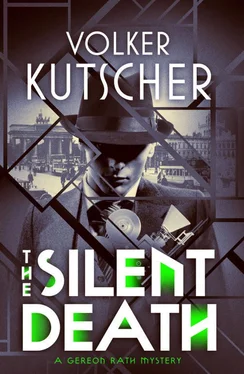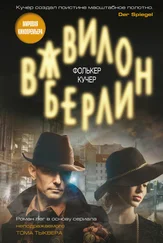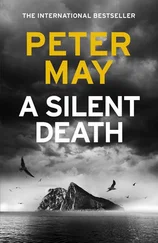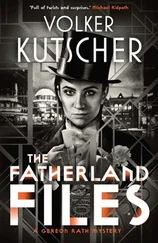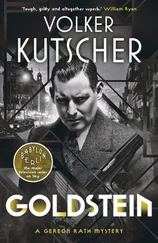You’re such a fool, he thought, creeping around like a burglar, like a stranger in your own home. He washed the thought down with cognac and poured another. He wouldn’t go through to her until he’d had enough.
Hazy and blurred in the warm, yellow island of light gleaming in the window pane, he lifted the glass to his reflection. The only company he could stand right now. ‘Cheers!’ he said drowsily…
He gave a start; had he been asleep or merely nodded off? His mouth tasted like a wrung-out cleaning rag and his glass was on the carpet next to the chair. Luckily he had drained it already.
Only now did he realise how much he must have had to drink. He needed a glass of water. In the kitchen he fetched a glass from the cupboard and held it under the tap, allowing the cold water to pour over his hands. It felt good. He drank and held the glass under the tap again.
He didn’t see the note until he was heading back to the door. Lying in the middle of the table was a little sheet of paper from the spiral-bound notebook she used to make her shopping lists.
Sorry, darling , he read, and felt his stomach cramping at the words, but I just couldn’t stand it any longer. I feel so alone in this flat when you’re not here. It really isn’t easy loving a policeman, but I’ve almost got used to it. Almost. Seems like today just wasn’t meant to be. I’ve called for a taxi and gone to my sister, she needs someone to comfort.
We’ll see each other at the ball tomorrow. I’ll try to be at yours by half past six, then we could go together.
With love
Kathi.
P.S. There’s some stew left on the stove. Remember it tastes best when it’s hot.
Rath placed the note back on the table.
On the one hand, he felt relief. On the other, now that he knew she was no longer in the flat, he was overcome by a loneliness that pained him almost physically. He was freezing, even though she had left the heating on. Only moments ago he had been trying to avoid her, seeking refuge in cognac, and would’ve sooner wished her in hell. Now he felt her absence like a stabbing pain to the heart.
At least he could go to bed, but was that what he really wanted? All of a sudden, he felt choked by a dreadful fear. The night wasn’t over yet; it had only just begun.
He went back into the living room, put on a Coleman Hawkins record and opened the bottle again.
He stares at the headline and tries to tell himself they are only letters. Bold, black letters on cheap paper.
Death in film studio! Betty Winter struck dead by spotlight!
They are only letters.
Letters are not reality.
Just a day later and he’d know they were lying. Death would no longer be able to claim her, not anymore, because she’d already be immortal.
He lets the paper drop. The smell of fresh coffee drifts towards him, suddenly seeming less real than the letters in the paper, than what the letters in the paper are telling him; it intensifies the feeling of impotence, an impotence he hasn’t felt for years.
She has been wrested from him.
‘Would Master like anything else?’
Albert is standing there, just as he has always stood there, even in those grim, chill years he would sooner erase from his life.
Albert is always there, has always been there. Every day, every single one.
The day the world…
On the day the world withdraws from his life, Albert stands at the window, closing the room’s heavy velvet green curtains. It is growing dark, only the dim gaslight remains, and the concerned faces, the stern faces, that look at him as if they mean to pin him down with their gaze, pin him down forever in this room.
They have caught him.
In the larder.
What were they thinking? What did they expect from a fifteen-year-old boy tormented by hunger and reduced to skin and bones in one of the city’s wealthiest homes – whose kitchen alone employs six staff? Whose larder can compete with those of the most expensive restaurants?
He’s been at it for weeks. He knew when the kitchen would be empty and the coast would be clear. Stomach rumbling, he would stand in front of all the delicacies and pick tentatively at things he wasn’t allowed to eat.
At sweet things.
It doesn’t matter how much he eats, he won’t get fat, that’s the way it’s been ever since he’s been afflicted by this disease.
And yet they realised.
Father realised and laid a devious trap for his son.
The shame of standing in the larder under their gaze, mouth smeared red, the bottle of juice in his hand. If only they were reproachful, but they are merely disappointed.
He’s just a child, Richard, Mother says. She has tears in her eyes.
We have to protect him from himself, Father says. Otherwise he’ll never grow up.
The servants are silent.
Albert closes the heavy door, the key turns loudly in the lock, and it is done. His imprisonment has begun; the world is now on the outside.
True, they still let him out, but only under supervision, two minders constantly at his side. No, he can’t accept that.
He bows to his fate.
Accepts that he can no longer have friends.
No longer find love in this world.
Fifteen years in which a dark curtain settles over everything.
Don’t let it! Create your own reality!
Free from pain, free from hunger, free from disease.
‘Would Master like anything else?’
Albert is the only constant in his life, the only enduring presence. He shakes his head and the old servant leaves the room in silence.
He folds the paper, as he always does.
For a brief moment, he would like to be another person, in another world, like on those long evenings in front of the screen; but reality won’t allow it, not this time.
Perhaps it is just a dream? But who decides what is dream, what reality?
The pain bores its way into his heart, dream or reality, for a long time it has made no difference.
Betty Winter struck dead by spotlight.
And then, in big letters, he sees that one word, framed by a question mark.
Sabotage?
His pain transforms into rage, into rage that knows no bounds. He reaches for the carefully folded newspaper and tears it, rips it into smaller and smaller pieces that swirl around him like oversized snowflakes.
Who has done this to him?
Who?
He loved her, damn it!
The Montana office was located at the expensive end of Kantstrasse. The blonde woman who had let him in indicated with a wave of the hand and a chilly glance that he should take a seat in one of the modern leather chairs in front of her desk, with no choice but to listen while she prattled into the telephone.
‘…but of course you can view our sound films with American devices; although you are then obliged to pay a small licensing fee, which you will naturally…’
The caller finally managed to get a word in. The blonde listened open-mouthed, waiting for her opportunity and – snap – let fly once more.
‘But of course! We’ll have the copies sent over to you with the paperwork, all you have to do is sign, that’s no problem; the rest is done automatically, I’ll see that the necessary steps are taken. We’ll be in touch, goodbye!’
She hung up and smiled at Rath. ‘What can I do for you?’
‘I’d like to speak to your managing director.’
‘Can I ask what it’s about?’
Rath took out his badge. ‘CID.’
‘Missing Persons?’
‘No, Homicide.’
She raised her eyebrows. ‘I’m afraid Herr Oppenberg hasn’t arrived yet.’
‘When are you expecting him?’
‘Could be a while. At the moment he heads to the shoot first thing, as there’s so much to do there. The schedule has to be changed daily since dear Fräulein Franck…’
Читать дальше
